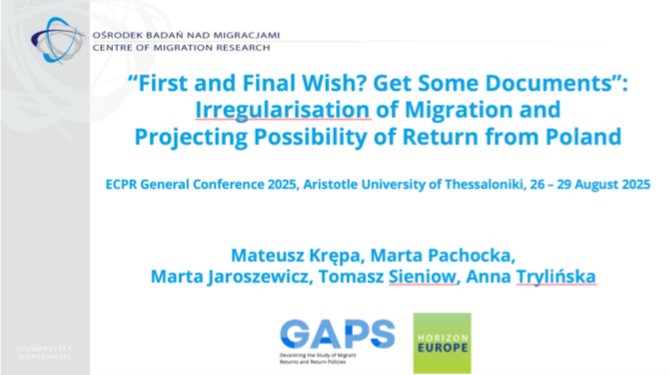GAPs Research on Irregularisation and Return Presented at ECPR General Conference 2025 by the team at CMR, University of Warsaw
Cover slide of Mateusz Krępa’s presentation of research results from HE GAPs project. Source: Renata Stefańska (CMR UW)
The Horizon Europe GAPs team from the Centre of Migration Research (CMR), University of Warsaw, presented the results of Work Package 7 (WP7) at the ECPR General Conference 2025, hosted by the Aristotle University of Thessaloniki on 28 August. Dr. Mateusz Krępa delivered the presentation titled “First and Final Wish? Get Some Documents”: Irregularisation of Migration and Projecting Possibility of Return from Poland, as part of the panel Forecasting Migration Trends and Understanding Migration Aspirations within the section International Migration: Policies and Practice. The paper was co-authored by Mateusz Krępa, Marta Pachocka, Marta Jaroszewicz, Tomasz Sieniow, and Anna Trylińska.
The research examined the link between becoming (or facing the risk of becoming) an irregular migrant in Poland and the prospect of return to the country of origin. Based on 31 interviews with migrants of different statuses who have experienced Poland’s migration system -including pushbacks at the Belarusian border - the team investigated how the policies of both origin and destination countries influence migrants’ decisions, often leading to irregular stay in Poland. The declared future projects of migrants were analysed to understand how past experiences and present threats shape their envisioned possibilities of return or onward migration.
Dr. Krępa argued that while state policies have limited impact on the decision to migrate, they strongly influence migrants’ well-being and integration opportunities. The analysis also identified strategies migrants adopt to cope with uncertainty and the risks of irregularisation - primarily through social networks and by sidelining thoughts of insecurity. It suggested further theoretical developments, including applying Bob Jessop’s Strategic Relational Approach (SRA), to better interpret the empirical material collected in WP7.
The presentation generated strong interest and a rich discussion with the panel chair, discussant, and audience. Key issues raised included the role of home country contexts, the shifting discourse on Ukrainians in Poland, the categorisation of migrants along the forced–voluntary spectrum, the normative dimensions of such classifications, the importance of migrants’ social relations, the potential for circular migration, and questions of psychology, identity, and operationalising SRA in migration research.
In his response, Dr. Krępa underlined the need to move beyond binary categories and instead consider a continuum of coercion. He stressed that while operationalising such concepts is challenging, the ultimate aim of migration research should be to distinguish human agency from internalised structures such as ideology, tradition, peer or family pressure, and even pop culture expectations. This approach, he argued, helps to clarify whether migration decisions stem from personal choice or from hidden forms of social pressure.
The lively exchange provided valuable insights for the GAPs team and will feed into the forthcoming scientific publication disseminating the findings of WP7.

